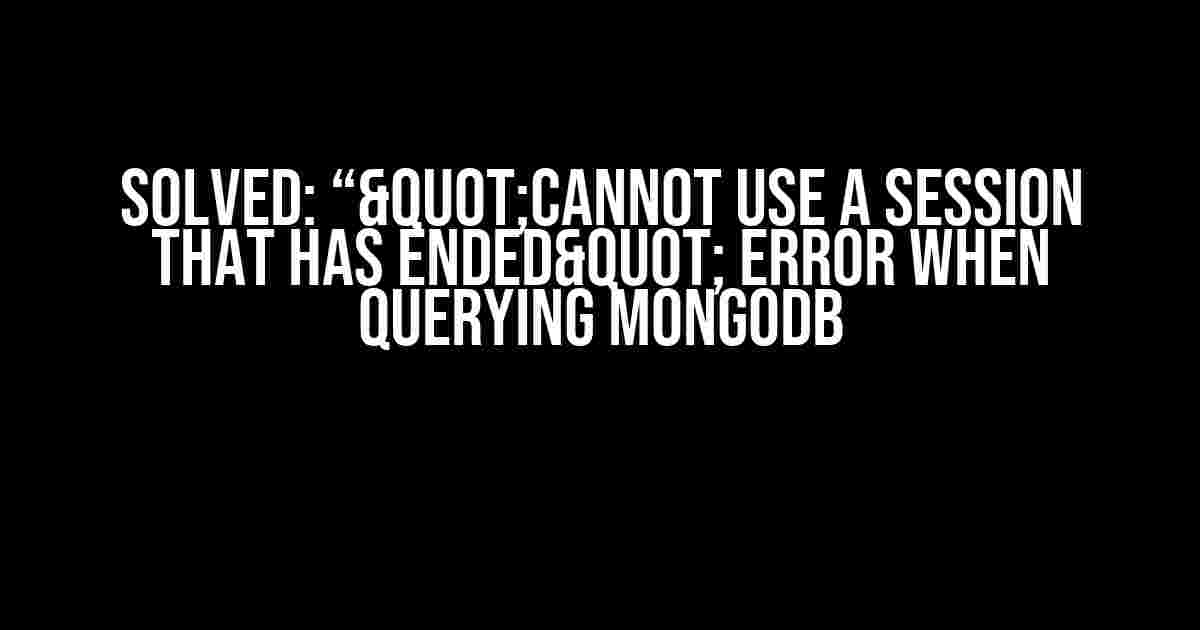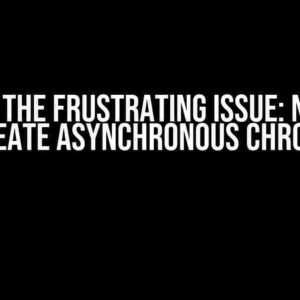Are you tired of encountering the frustrating “"Cannot use a session that has ended" error when querying MongoDB? You’re not alone! This error can be a real showstopper, especially when you’re in the middle of a critical project or on a tight deadline. But fear not, dear MongoDB enthusiast, for we’re about to dive into the world of sessions and transactions, and come out the other side with a thorough understanding of how to overcome this pesky error.
What is a MongoDB Session?
Before we dive into the error itself, let’s take a step back and understand what a MongoDB session is. A session in MongoDB is a way to group multiple operations together, allowing you to execute them as a single, atomic unit of work. Think of it like a transaction in a traditional relational database. This allows you to ensure that either all operations are committed, or none are, maintaining data consistency and integrity.
Sessions are particularly useful when working with replica sets, where you need to ensure that data is properly replicated across multiple nodes. By using a session, you can guarantee that all operations are executed on the primary node, and then replicated to the secondary nodes.
The “"Cannot use a session that has ended" Error
Now, let’s talk about the error itself. The “"Cannot use a session that has ended" error typically occurs when you’re trying to use a session that has already been terminated or closed. This can happen in a few different scenarios:
- You’ve closed the session explicitly using the `endSession()` method.
- The session has timed out due to inactivity.
- The session has been terminated by the MongoDB server due to an error or server restart.
In each of these cases, the session is no longer valid, and attempting to use it will result in the “"Cannot use a session that has ended" error.
Solution 1: Check for Session Status
The first solution is to simply check the status of the session before attempting to use it. You can do this using the `getSession()` method, which returns the current session object. From there, you can check the `hasEnded()` method to see if the session has been terminated:
const session = client.startSession();
// ...
if (session.hasEnded()) {
console.log("Session has ended. Create a new one!");
session = client.startSession();
} else {
console.log("Session is still active. Proceed with query.");
// Execute your query here
}
By checking the session status, you can avoid using a session that has already ended, and create a new one if necessary.
Solution 2: Use a New Session
Another solution is to simply create a new session whenever you need to execute a query. This ensures that you’re always working with a fresh, active session:
const client = new MongoClient("mongodb://localhost:27017/", { useNewUrlParser: true, useUnifiedTopology: true });
const db = client.db();
const collection = db.collection("mycollection");
const session = client.startSession();
try {
// Execute your query here
session.withTransaction(() => {
collection.insertOne({ name: "John" }, { session });
});
} catch (err) {
console.error(err);
} finally {
session.endSession();
}
In this example, we create a new session using the `startSession()` method, and then execute our query within a transaction using the `withTransaction()` method. Finally, we end the session using the `endSession()` method to release any system resources.
Solution 3: Use a Session Pool
A more advanced solution is to use a session pool, which allows you to manage multiple sessions and reuse them as needed. This can be particularly useful in high-traffic applications where you need to execute multiple queries concurrently:
const sessionPool = [];
function getSession() {
if (sessionPool.length === 0) {
const session = client.startSession();
sessionPool.push(session);
return session;
} else {
return sessionPool.pop();
}
}
function returnSession(session) {
sessionPool.push(session);
}
const session = getSession();
try {
// Execute your query here
session.withTransaction(() => {
collection.insertOne({ name: "John" }, { session });
});
} catch (err) {
console.error(err);
} finally {
returnSession(session);
}
In this example, we create a session pool as an array, and use the `getSession()` function to retrieve a session from the pool. If no sessions are available, we create a new one using the `startSession()` method. When we’re done with the session, we return it to the pool using the `returnSession()` function.
Best Practices for MongoDB Sessions
To avoid the “"Cannot use a session that has ended" error and ensure smooth operation, follow these best practices for working with MongoDB sessions:
- Use sessions judiciously: Only use sessions when necessary, such as when working with replica sets or executing complex transactions.
- Check session status: Always check the status of a session before attempting to use it.
- Use a session pool: Implement a session pool to manage multiple sessions and reuse them as needed.
- End sessions explicitly: Always end sessions explicitly using the `endSession()` method to release system resources.
- Avoid session timeouts: Configure your MongoDB server to avoid session timeouts due to inactivity.
Conclusion
The “"Cannot use a session that has ended" error can be frustrating, but with these solutions and best practices, you’ll be well-equipped to overcome it and make the most of MongoDB sessions. Remember to check session status, use new sessions when necessary, and implement a session pool for high-traffic applications. By following these guidelines, you’ll be able to write robust, efficient, and scalable MongoDB applications that take advantage of the power of sessions and transactions.
| Solution | Description |
|---|---|
| Check Session Status | Check the status of a session before attempting to use it. |
| Use a New Session | Create a new session whenever you need to execute a query. |
| Use a Session Pool | Implement a session pool to manage multiple sessions and reuse them as needed. |
By implementing these solutions and following best practices, you’ll be able to avoid the “"Cannot use a session that has ended" error and unlock the full potential of MongoDB sessions. Happy coding!
Frequently Asked Question
Getting stuck with the frustrating “Cannot use a session that has ended” error when querying MongoDB? Don’t worry, we’ve got you covered! Here are some answers to your burning questions:
What causes the “Cannot use a session that has ended” error in MongoDB?
This error typically occurs when you’re trying to use a MongoDB session that has already been closed or expired. This can happen when you’re using a connection pooling mechanism, and the pool has closed the underlying connection. Another possible cause is a network issue or a timeout that caused the session to expire.
How can I check if a MongoDB session is still active?
You can use the `session.getInfo()` method to check if a MongoDB session is still active. This method returns a document containing information about the session, including its status. If the session has ended, the `ended` field will be set to `true`. Alternatively, you can use the `session.hasEnded()` method, which returns a boolean indicating whether the session has ended.
Can I reuse a MongoDB session after it has ended?
No, you cannot reuse a MongoDB session after it has ended. Once a session has ended, it cannot be reused or restarted. You’ll need to create a new session using the `startSession()` method or retrieve a new session from the connection pool.
How can I prevent the “Cannot use a session that has ended” error in my application?
To prevent this error, make sure to check the session status before using it, and create a new session if it has ended. You can also implement a retry mechanism to handle cases where the session ends unexpectedly. Additionally, consider using a connection pooling mechanism that automatically handles session management and retries.
What are some best practices for handling MongoDB sessions in my application?
Some best practices for handling MongoDB sessions include: using a connection pooling mechanism, checking the session status before using it, implementing retry mechanisms, and using transactions to ensure atomicity and consistency. You should also consider using a MongoDB driver that provides built-in support for session management, such as the MongoDB Node.js driver.


